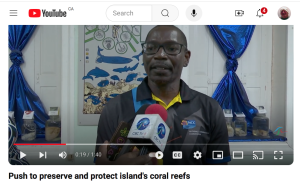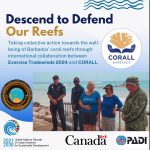“Middle islands: Moderate influxes are expected to continue during June with a reduction in July and August.” That is a bit of a downgrade from the previous forecast.
 Continue reading
Continue reading
CERMES: Sargassum outlook moderate 1 June – 1 September 2024
Recent AGRRA Webinars examine Coral Bleaching, Invasive Soft Coral, Restoration Efforts, Acropora Heat Mortality 6Jun2024
The Atlantic and Gulf Rapid Reef Assessment (AGRRA) website at www.agrra.org offers a large suite of educational materials and regional databases/interactive maps related to coral reefs in the Caribbean. A few of the resources are highlighted below.
Cited as New Webinars at aggra.org/RESOURCES/webinars:
– 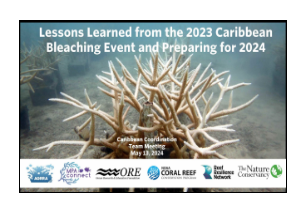 Lessons Learned from the 2023 Caribbean Bleaching Event and Preparing for 2024 – CCT May 13, 2024
Lessons Learned from the 2023 Caribbean Bleaching Event and Preparing for 2024 – CCT May 13, 2024
On YouTube | Presentation Slide Deck (PDF)
“As NOAA announces the fourth global bleaching event, restoration practitioners, scientists and reef managers across the Caribbean and Florida are assessing the actions they took to respond to the 2023 thermal event and planning for the possibility of similar conditions in 2024. On May 13th from Noon-1:30 pm EST, practitioners across the region discussed actions that were implemented, and the lessons learned that could help inform future responses…”
Continue reading
CERMES: Sargassum outlook severe 29Apr to 30Jul2024
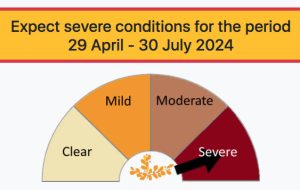 “Middle islands: Moderate to severe influxes are expected over the next 2 months with severe accumulations in July.”
“Middle islands: Moderate to severe influxes are expected over the next 2 months with severe accumulations in July.”
Read more in the Sargassum Sub-regional Outlook Bulletin by the Sargassum Team at The Centre for Resource Management and Environmental Studies (CERMES) at the Cave Hill Campus of The University of the West Indies, Barbados.
The “Middle Islands” include Barbados.
AGRRA on New Caribbean Coral Restoration Efforts 3May2024
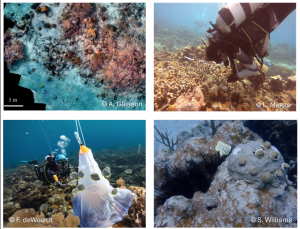 “New Caribbean Coral Restoration Efforts” was the subject of the Caribbean Cooperation Team Network Meeting on April 8, 2024.
“New Caribbean Coral Restoration Efforts” was the subject of the Caribbean Cooperation Team Network Meeting on April 8, 2024.
A webinar recording of the full proceedings is now available, courtesy of AGRRA (Atlantic and Gulf Rapid Reef Assessment).
From a notice just received:
| The focus of the April Caribbean Cooperation Team (CCT) meeting was to share updates on new coral reef rescue and recovery efforts in the Caribbean with funding from the G20’s new Coral Research & Development Accelerator Platform (CORDAP). After an introduction to CORDAP, representatives described the Caribbean programs funded by CORDAP grants this year. Continue reading |
“Corals in danger, coastal protection chief warns” – Barbados Today 17Apr2024
“Barbados’ coral reefs are in serious trouble, even as officials try to restore their health and protect them from a deadly heat wave that has decimated them worldwide.
“Director of the Coastal Zone Management Unit (CZMU) Leo Brewster said his department in collaboration with the University of the West Indies has been closely monitoring the situation through a just-ended five-year coral reef survey.”
Coral bleaching, stony coral tissue loss disease, and groundwater pollution are cited as factors threatening coral health in Barbados.
Read more in Barbados Today
Brain corals at Bath on Barbados east coast appear free of disease 31Mar2024
With the collaboration of Dr. Elon Cadogan of CORALL Barbados, on Mar 28, 2024, I made a brief visit to Bath around the Low Tide when wave action is minimal and underwater visibility highest. One objective I had was to examine the large brain corals in the “Platform Lagoon” to see if they had been affected by Stony Coral Tissue Loss Disease which ravaged corals on the west coast beginning circa Nov 2022.
I postulated that as this site is flushed continuously with Atlantic ocean water coming from the east and should be comparatively free of water from other islands*, the corals would be SCTLD-free.
*While the general circulation is east to west, there is much greater chance of mixing with Caribbean water in the lee of the island, e.g., from flushing of bilges of large vessels in Bridgetown harbour – see Rosenau et al., 2021 – than on the east, Atlantic coast.
Healthy Pillar Coral colony on Vauxhall Reef 23Mar2024

Pillar Coral in Reef Front zone of Vauxhall Reef, Mar 22, 2024. Pillar Coral in Reef fron zone of Vauxhall Reef, Mar 22, 2024. The species is considered Critically Endangered (U.S.)
It’s a rare day when I spend time at Vauxhall Reef and don’t find “something new” or get an especially good photo of a species I have been chasing for a while.
Today’s (Mar 22, 2024) find was an entirely healthy colony of Pillar Coral (Dendrogyra cylindrus) in the Reef Front zone.
There were a dozen plus healthy colonies of Pillar coral at Vauxhall prior to the arrival of SCTLD in 2023. Pillar coral is considered by AGGRA to be Highly Susceptible to SCTLD, and it seemed odd in early 2023 that these colonies remained healthy while there were seemingly many corals with SCTLD. However, all colonies of Pillar Coral I have seen to date this year (2024) were entirely or mostly dead. So my secret hope that perhaps the pillar corals at Vauxhall had qualities, e.g. related to their associated microbes, that made them resistant to SCTLD was no more.
But now I can hope that there is something special about this one specimen! I will surely keep an eye on it, also on new growth on colonies killed by SCTLD
READ MORE
First diseased P.clivosa on Reef Flat at Vauxhall observed 10Mar2024
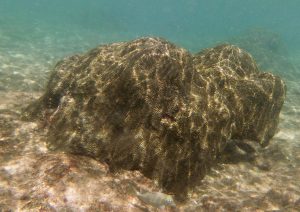
Healthy P. clivosa on the Reef Flat, Jan 15, 2024. Click on images for larger versions. More Pics
Large mounds of Pseudodiploria clivosa are common on the Reef Flat and Diploria-Palytoa zones at Vauxhall and can assume some quite striking, even majestic, forms.
I had not seen diseased Pseudodiploria clivosa amongst these big specimens at Vauxhall until I viewed this large specimen on the Reef Flat on Mar 10, 2024. It’s a large specimen, located about 1/3rd of the distance out from shore to the Reef Crest area. It has symptoms of Stony Coral Tissue Loss Disease (view AGGRA Card).

